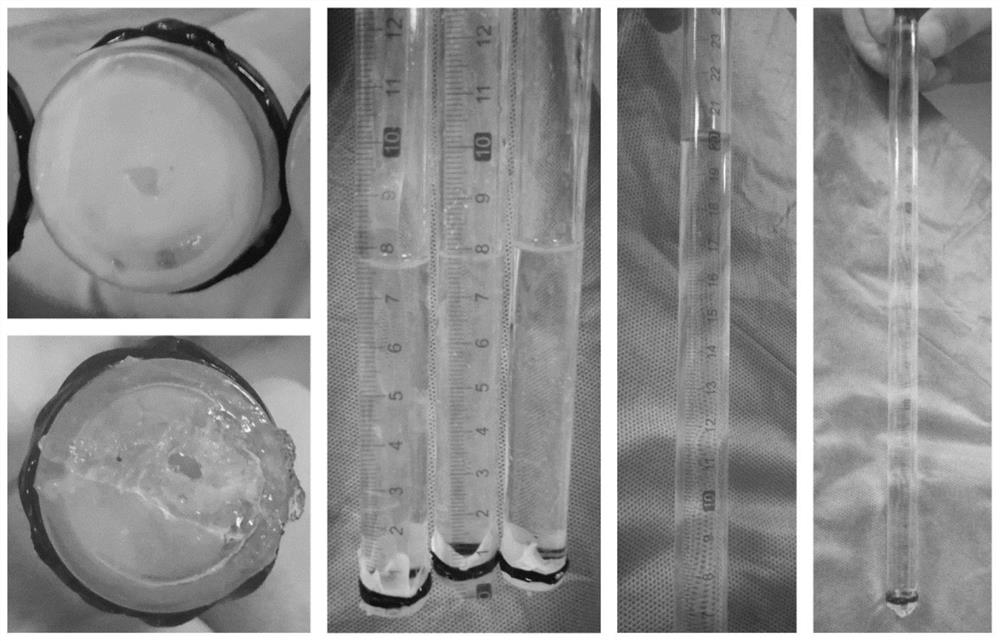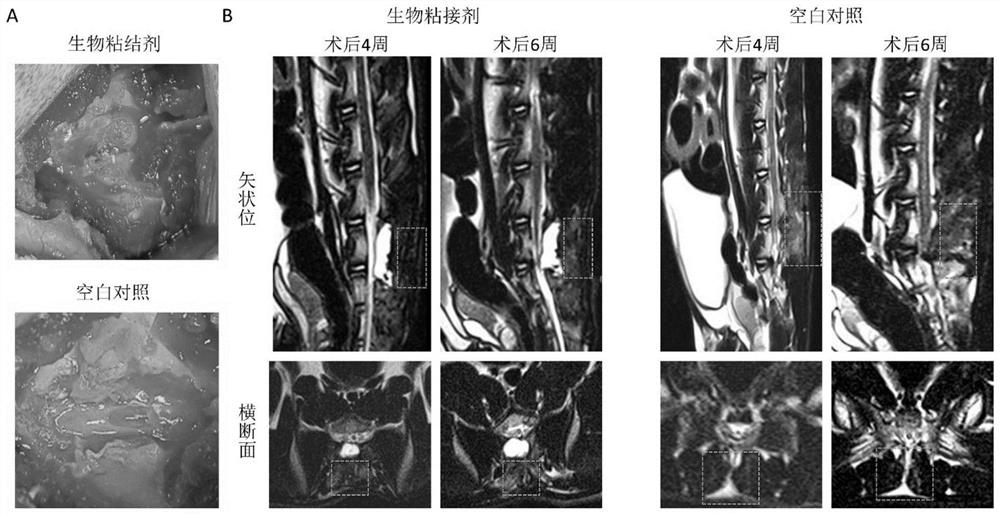A kind of biological adhesive and its preparation method and application
A bio-adhesive, polyethylene glycol succinimide succinate technology, applied in the field of bio-adhesives and its preparation, can solve problems such as inability to suture effectively, poor repair effect, and inability to use alone. Achieve the effect of reducing surgical risk, shortening operating time, and good biocompatibility
- Summary
- Abstract
- Description
- Claims
- Application Information
AI Technical Summary
Problems solved by technology
Method used
Image
Examples
preparation example Construction
[0048] The preparation method of the bioadhesive of the present disclosure includes the following steps:
[0049] Step (1): The four-arm polyethylene glycol amino group is prepared into a first solution. The molecular weight of the four-arm polyethylene glycol amino group may be 2000-20000 Daltons.
[0050] In order to facilitate the use of the bioadhesive, the mass concentration of the four-arm polyethylene glycol amino group in the first solution in step (1) is 50 mg / mL-500 mg / mL.
[0051] Further, the mass concentration of the four-arm polyethylene glycol amino group in the first solution in step (1) is 100 mg / mL-300 mg / mL.
[0052] During specific implementation, the solvent of the first solution in step (1) may be one of secondary water, ultrapure water, physiological saline, or phosphate buffer with a pH of 7.4.
[0053] Step (2): Four-arm polyethylene glycol succinimidyl succinate is formulated into a second solution.
[0054] In order to facilitate the use of the bi...
Embodiment 1
[0072] 400 mg of four-arm polyethylene glycol amino group (molecular weight of 20,000 Daltons) was weighed and dissolved in 2 mL of pure water to obtain the first solution. 300 mg of four-arm polyethylene glycol succinimidyl succinate (molecular weight: 20,000 Daltons) and 1.2 mg of genipin were weighed and dissolved in 2 mL of pure water to obtain a second solution. Use a double-barreled syringe to draw the first solution and the second solution, and inject the first solution and the second solution into the sample bottle at the same time, then invert the sample bottle, and record the gel time. The time when the gel does not flow back is the gelation time. The gel time was tested by the inversion method. The experimental results show that the gel formation time is 5-10 seconds, which meets the requirements of intraoperative operation.
Embodiment 2
[0074] 250 mg of four-arm polyethylene glycol amino group (molecular weight of 10,000 Daltons) was weighed and dissolved in 1 mL of pure water to obtain the first solution. 120 mg of four-arm polyethylene glycol succinimidyl succinate (molecular weight: 5000 Daltons) and 0.3 mg of genipin were weighed and dissolved in 1 mL of purified water to obtain a second solution. Use a double-barreled syringe to draw the first solution and the second solution, and inject the first solution and the second solution into the sample bottle at the same time, then invert the sample bottle, and record the gel time. The time when the gel does not flow back is the gelation time. The gel time was tested by the inversion method. The experimental results showed that the gel formation time was 5 to 20 seconds, which met the requirements of intraoperative operation.
PUM
| Property | Measurement | Unit |
|---|---|---|
| molecular weight | aaaaa | aaaaa |
| concentration | aaaaa | aaaaa |
| concentration | aaaaa | aaaaa |
Abstract
Description
Claims
Application Information
 Login to View More
Login to View More - Generate Ideas
- Intellectual Property
- Life Sciences
- Materials
- Tech Scout
- Unparalleled Data Quality
- Higher Quality Content
- 60% Fewer Hallucinations
Browse by: Latest US Patents, China's latest patents, Technical Efficacy Thesaurus, Application Domain, Technology Topic, Popular Technical Reports.
© 2025 PatSnap. All rights reserved.Legal|Privacy policy|Modern Slavery Act Transparency Statement|Sitemap|About US| Contact US: help@patsnap.com


